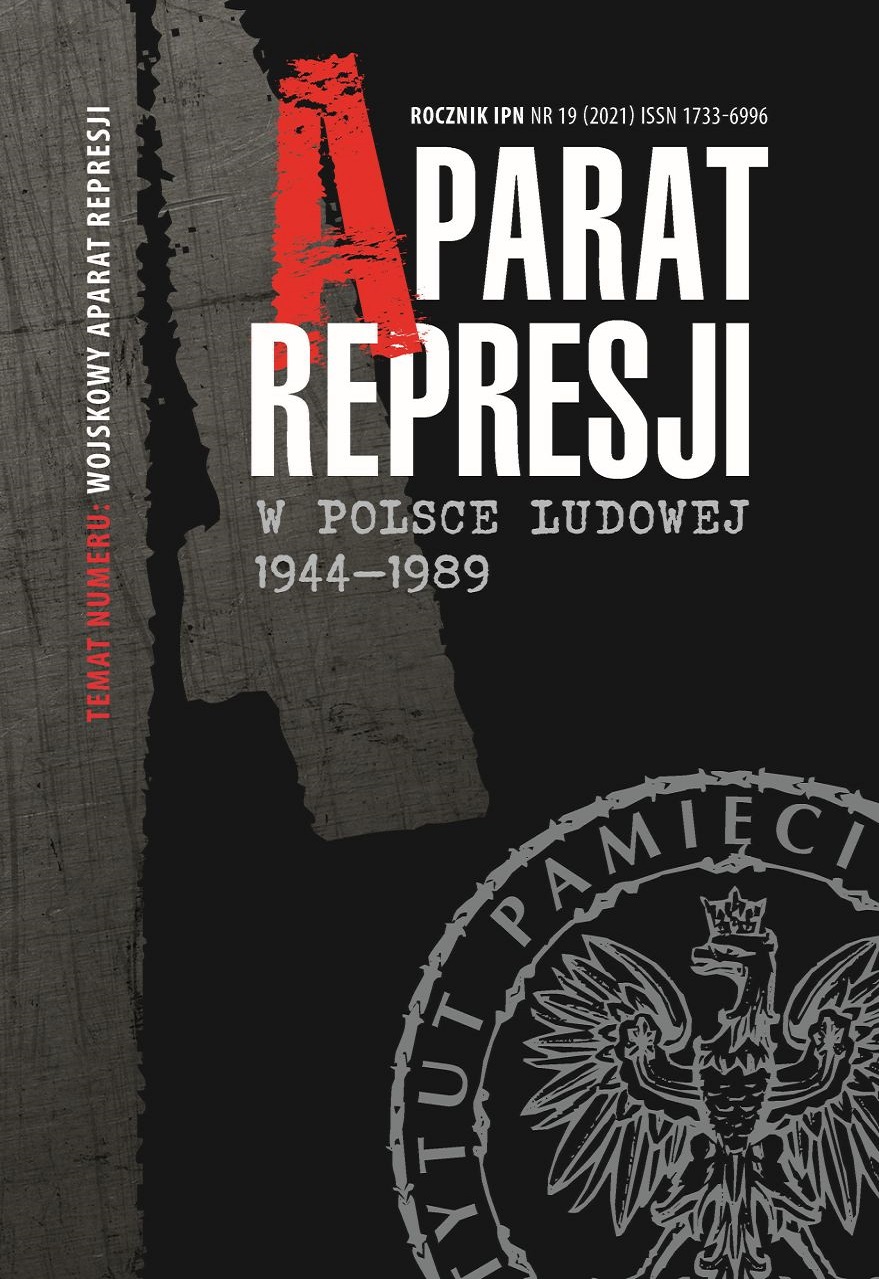Organising Citizens’ Militia in the Cracow Voivodeship in the Light of Reports from 1945
Aparat Represji w Polsce Ludowej 1944-1989, No. 19 (2021), pages: 580-616
Publication date: 2023-03-29
 https://doi.org/10.48261/ARPRL211914
https://doi.org/10.48261/ARPRL211914
Abstract
The organisation of the Citizens’ Militia in Poland is a topic that has already been discussed on a national scale. However, on the local ground there is still the lack of more detailed analyses for individual voivodeships and this is the case of the Cracow Voivodeship. Towards the end of 1944, when the appropriate legal ordinances fixing future servicemen in the apparatus of power had already been issued, groups composed mostly of former People’s Army [AL] partisans began to be organised in Rzeszów to fill subsequent voivodeships with future militiamen in the wake of the front heading west. The establishment of the Cracow Voivodeship Headquarters of the Militia took place immediately after the January offensive of the Red Army, and convoys with officers reached Cracow, occupied by the Soviet army, soon after the cessation of hostilities in the city. Soon, commanders arrived in all districts of the voivodeship to establish local Citizens’ Militia (MO) structures. In this way, district headquarters, police stations and local posts were efficiently organised, and founding reports describing local conditions faced by the officers began to arrive at the voivodeship headquarters. In mid-1945, the whole voivodeship was inspected by a special group sent from Cracow, and the conclusions of its reports were sent to the voivodeship headquarters for analysis. It is assumed that by the end of 1945 the first stage of organising MO structures in the voivodeship was successfully completed.
References
Archiwum IPN w Warszawie (AIPN)
Oddziałowe Archiwum IPN Krakowie (AIPN Kr)
Oddziałowe Archiwum IPN w Rzeszowie (AIPN Rz)
Oddziałowe Archiwum IPN w Szczecinie (AIPN Sz)
Oddziałowe Archiwum IPN we Wrocławiu (AIPN Wr)
Atlas polskiego podziemia niepodległościowego 1944–1956, red. R. Wnuk i in., Warszawa–Lublin 2007
Frazik W., Struktura organizacyjna Urzędu Bezpieczeństwa w województwie krakowskim w latach 1945–1956 w świetle aktów normatywnych [w:] Strażnicy sowieckiego imperium. Urząd Bezpieczeństwa i Służba Bezpieczeństwa w Małopolsce 1945–1990, red. F. Musiał, M. Wenklar, Kraków 2009
Guzik J., Racławickie wezwania. Monografia okupacyjna ziemi miechowskiej 1939–1945, Kraków 1987
Iwaneczko D., Nawrocki Z., Rok pierwszy. Powstanie i działalność aparatu bezpieczeństwa publicznego na Rzeszowszczyźnie (sierpień 1944 – lipiec 1945), Rzeszów 2005
Kasprzycki M., Milicja Obywatelska w powiecie Nowy Sącz w latach 1945–1949, „Zeszyty Historyczne WiN-u” 2012, nr 35
Majer P., Milicja Obywatelska 1944–1957. Geneza, organizacja, działalność, miejsce w aparacie władzy, Olsztyn 2004
Majer P., Niewprowadzone w życie akty normatywne powojennego aparatu policyjnego w Polsce 1944–1948, „Przegląd Policyjny” 2007, nr 4(88)
Majer P., „Oczyszczanie” szeregów Milicji Obywatelskiej w latach 1944–1954 [w:] Między I a IV Rzeczpospolitą. Z dziejów lustracji na ziemiach polskich w XIX i XX wieku, red. M. Korybut-Marciniak, P. Majer, Olsztyn 2009
Paryła W., Oddali życie za wolną Polskę, Warszawa 1987
Skrzypczak J., Policja w Mielcu 1919–2019, Mielec 2020
Surdej M., Trzy konspiracje. Historia Aleksandra Rusina ps. „Rusal”, Rzeszów–Warszawa 2020
Szwagrzyk K., Prawnicy czasu bezprawia. Sędziowie i prokuratorzy wojskowi w Polsce 1944–1956, Kraków–Wrocław 2005
Tuszyński B., Bardowie sportu, Warszawa 2009
Wenklar M., Na flankach Podhala. Trudny powrót Spiszu i Orawy do Polski po II wojnie światowej, „Biuletyn IPN” 2010, nr 1–2
Wroński T., Kronika okupowanego Krakowa, Kraków 1974
Katalog pracowników, funkcjonariuszy, żołnierzy organów bezpieczeństwa państwa, bip.ipn.gov.pl, dostęp 13 V 2021 r.
License

This work is licensed under a Creative Commons Attribution-NonCommercial-NoDerivatives 4.0 International License.
 Język Polski
Język Polski
 English
English



 PDF (Język Polski)
PDF (Język Polski)
